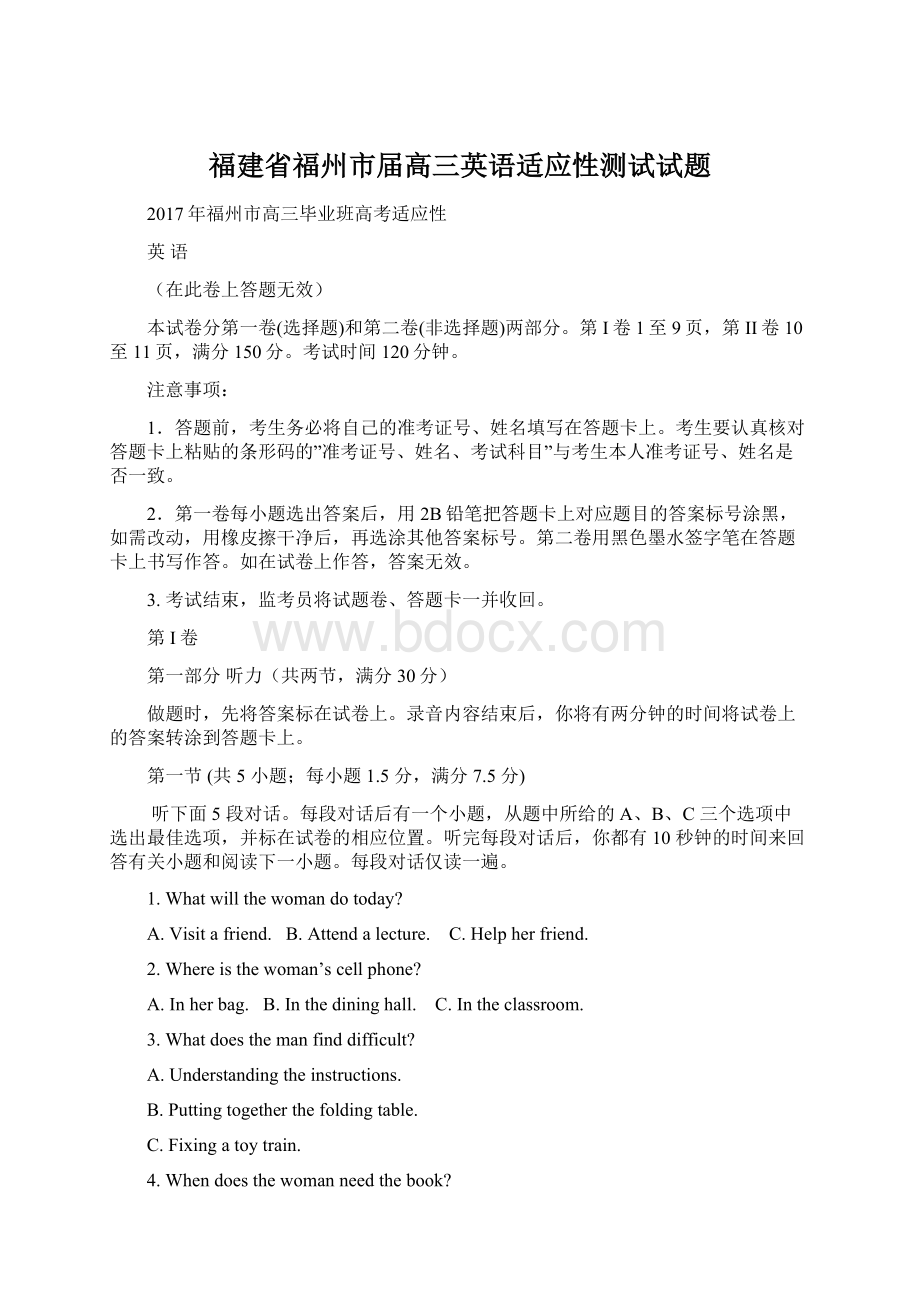福建省福州市届高三英语适应性测试试题Word格式.docx
《福建省福州市届高三英语适应性测试试题Word格式.docx》由会员分享,可在线阅读,更多相关《福建省福州市届高三英语适应性测试试题Word格式.docx(19页珍藏版)》请在冰豆网上搜索。

第I卷
第一部分听力(共两节,满分30分)
做题时,先将答案标在试卷上。
录音内容结束后,你将有两分钟的时间将试卷上的答案转涂到答题卡上。
第一节(共5小题;
每小题1.5分,满分7.5分)
听下面5段对话。
每段对话后有一个小题,从题中所给的A、B、C三个选项中选出最佳选项,并标在试卷的相应位置。
听完每段对话后,你都有10秒钟的时间来回答有关小题和阅读下一小题。
每段对话仅读一遍。
1.Whatwillthewomandotoday?
A.Visitafriend.B.Attendalecture.C.Helpherfriend.
2.Whereisthewoman’scellphone?
A.Inherbag.B.Inthedininghall.C.Intheclassroom.
3.Whatdoesthemanfinddifficult?
A.Understandingtheinstructions.
B.Puttingtogetherthefoldingtable.
C.Fixingatoytrain.
4.Whendoesthewomanneedthebook?
A.OnApril1st.B.OnApril2nd.C.OnApril3rd.
5.Whatdoesthemanmean?
A.Mostreadersdon’tagreewithhim.
B.Thewomancan’tconvincehim.
C.Fewpeoplereadhisarticle.
第二节(共15小题;
每小题1.5分,满分22.5分)
听下面5段对话或独白。
每段对话或独白后有几个小题,从题中所给的A、B、C三个选项中选出最佳选项,并标在试卷的相应位置。
听每段对话或独白前,你将有时间阅读各个小题,每小题5秒钟;
听完后,各小题将给出5秒钟的作答时间。
每段对话或独白读两遍。
听第6段材料,回答第6、7题。
6.Wheredidthewomanstayatnightduringtheholiday?
A.Inatent.B.Inahotel.C.Inafarmhouse.
7.Whatdoesthewomanthinkofthepeoplethere?
A.Theywereinteresting.B.Theywerefriendly.C.Theywerehonest.
听第7段材料,回答第8、9题。
8.Whatarethespeakersmainlytalkingabout?
A.Pocketmoney.B.Part-timejobs.C.Theman’sparents.
9.Howlongdoesthemantakecareofhisneighbor’sbabyeveryFriday?
A.Fortwohours.B.Forthreehours.C.Forfourhours.
听第8段材料,回答第10至12题。
10.WhatrelationisCindytoEdward?
A.Hisformerprimaryschoolmate.
B.Hisgroupmember.
C.Histeacher.
11.WhatcanEdwarddointhetheatergroup?
A.Meetfamousartists.B.Performplaysandmusicals.C.Seefilms.
12.Wherearethespeakers?
A.Atschool.B.Inaplaytheater.C.Outsideacinema.
听第9段材料,回答第13至16题。
13.Whendoesthewomangototherestaurant?
A.Intheearlymorning.B.Inthemiddleofthemorning.C.Atnoon.
14.Whatdoesthewomanlikemostabouttherestaurant?
A.Thequietenvironment.B.Thedeliciousfood.C.Thejazzmusic.
15.Whatdoesthemansayabouthisfavoriterestaurant?
A.It’snewlyopenedandclean.
B.Hethinkshighlyofthefood.
C.Afilmactoreatstheresometimes.
16.Whatdoesthemanhaveforlunch?
A.Pancakes.B.Fishpie.C.Sausages.
听第10段材料,回答第17至20题。
17.Whatis“WhattoDoToday”?
A.Aradioprogram.B.Asocialorganization.C.Aschoolteam.
18.What’sthemainpurposeofthetree-plantingactivity?
A.Tohelppoorblindchildren.
B.Togaintree-plantingexperience.
C.Toraisemoneyforacomputercompany.
19.Howmanytreesdostudentsandtheirparentswanttoplanttoday?
A.30.B.750.C.1,500.
20.Whatshouldvolunteersbringfortheactivity?
A.Hats.B.Thickgloves.C.Basictools.
第二部分阅读理解(共两节,满分40分)
第一节(共15小题;
每小题2分,满分30分)
阅读下列短文,从每题所给的A、B、C和D四个选项中,选出最佳选项,并在答题卡上将该项涂黑。
A
Nohumanhassetfootonthemoonsince1972.Now,aftermorethanfourdecadesofinactivity,interestinputtinghumansbackontheMoonisfinallyheatingupagain.Butwhowillgettherefirst?
CHINA
On14December2013,ChinasuccessfullylandeditsJadeRabbitrover(探测车)onthemoon.Itisnowworkingonitsnextexplorationmission.NamedChang’e4,themissionisscheduledtotouchdownintheAitkenBasinneartheendof2018.Ifsuccessful,itwillbethefirstlandingontheMoon’sfarside.
RUSSIA
RussiaplansamannedMoonlandingin2030.Itiscurrentlyworkingonaprojectwhoseideaisthatthelanderswillexplorethesouthpoleofthemoon,exploringforresourcessuchasmineralsandwatericetobeusedtoprovideforahumanoutpost(前哨站).
INDIA
FollowingthesuccessofitsChandrayaan-1in2008,Indiaannouncedafollow-onmission.Chandrayaan-2wasmeanttocooperatewithRussia.ButwhentheRussiansfailedtodeliverthepromisedlanderin2013,Indiadecidedtogoitalone.Chandrayaan-2isabouttobesentupin2018.
USA
InDecember2018,NASAplanstosenduptheExplorationMission1,anuncrewedtestoftheirOrionastronautcapsuleinwhichthecraftwillcirclearoundtheMoonbeforereturningtoEarth.Allbeingwell,acrewedcapsulewillfollowin2023.Shouldthemissionproveasuccess,theastronautswillbethefirsthumanstoseethefarsideoftheMoonwiththeirowneyessinceApollo17in1972.
21.WhatwillChinadoinitsnextspacemission?
A.ImproveitsJadeRabbitrover.
B.Workwithothercountries.
C.LandChang’e4onthemoon.
D.Explorethesouthpoleofthemoon.
22.WhydidIndiatrytocarryoutitsfollow-onmissionalone?
A.Itcouldn’tfindapartner.
B.Itdidn’tgetthelanderasplanned.
C.TheRussiansrefusedtoworkwithIndia.
D.ItplannedtolaunchChandrayaan2inadvance.
23.Whichcountryisinterestedinresourcesonthemoon?
A.Russia.B.China.C.India.D.USA.
24.Whatcanweknowfromthetext?
A.Russiahasbuiltahumanoutpostonthemoon.
B.Chinawillbethefirsttoseethefarsideofthemoon.
C.USAwillsendacrewedcapsuletothemooninthefuture.
D.Humanshavekeptactiveinexploringthemoonsince1972.
B
Knownas“TheManwiththeGoldenArm,”nearlyeveryweekforthepast60years,JamesHarrisonhasdonatedbloodplasma(血浆)fromhisrightarm.Thereasonscandatebacktoaseriousmedicalprocedure.
“WhenIwas14,Ihadachestoperation,”recallsHarrison,whoisnowaged78.“MyfathersaidIhadreceived13unitsofbloodandmylifehadbeensavedbyunknownpeople.SoIsaidwhenI’moldenough,I’llbecomeablooddonor.”
SoonafterHarrisonbecameadonor,doctorscalledhimin.Hisblood,theysaid,couldbetheanswertoadeadlyproblem.
“InAustralia,upuntilabout1967,therewereaboutthousandsofbabiesdyingeachyearbecauseoftherhesusdisease(恒河猴症).”explainsJemmaFalkenmire,ofthe
AustralianRedCrossBloodService.
Harrisonwasdiscoveredtohaveanunusualantibody(抗体)inhisbloodandinthe1960sheworkedwithdoctorstousetheantibodiestodevelopaninjection(注射剂)calledAnti-Dwhichcanpreventthisdisease.
Harrison’sbloodisprecious.EverybatchofAnti-DthathaseverbeenmadeinAustraliahascomefromHarrison’sblood.HeandAnti-Darecreditedwithsavingthelivesofmorethan2millionbabies,accordingtotheAustralianRedCrossbloodservice:
That’s2millionlivessavedbyoneman’sblood.
Harrisonisconsideredanationalhero,andhaswonnumerousawards.Hehasnowdonatedhisplasmamorethan1,000times,butnomatterhowmanytimeshe’sgivenbloodthere’sonethingthatwillneverchange:
“Ilookattheceilingorthenurses,maybetalktothemabit,butneveroncehaveIwatchedtheneedlegoinmyarm.Ican’tstandthesightofblood,andIcan’tstandpain.”hesays.
25.WhatwasthemainreasonforHarrison’sbecomingablooddonor?
A.Hehasagoldenarm.B.Hehaspreciousbloodplasma.
C.Hisfatherencouragedhimtohelpothers.D.Donatedbloodoncemadehimsurvive.
26.WhyisJames’bloodmoreprecious?
A.JameshastheAnti-Dinhisblood.
B.Hisbloodismoreusefulintreatingtherhesusdisease.
C.James’bloodisthemainsourceofAnti-DinAustralia.
D.Jameshasdonatedmoreplasmathanotherdonators.
27.HowdoesHarrisonfeelwhendonatinghisplasma?
A.Nervous.B.Relaxed.C.AnxiousD.Excited.
C
Inthisdayandage,itmayseemlikegettingtwopeoplewithdifferentviewstogethertodiscussthemis
arecipefordisaster.Justthinkaboutwhatwouldhappenifyousatdownandhadanopenandhonestconversationwithsomeonewithcompletelyopposingviews.Coulditbringyouclosertogether?
However,theHumanLibraryOrganizationiscountingonit.
AtaHumanLibrary,peoplevolunteertobecome“books”andmaketheirexperiencesopenandavailable.“Readers”areencouragedtoaskthemquestionsfreely,andthey’llgethonestanswersinreturn.There’snojudgment,andnoquestionsareoff-limits.
Youwon’tfindunpleasantcomments,andyouwon’tlosefaithinhumanity.AttheHumanLibrary,youactuallyfeelbetterabouttheworldyoulivein.Youmightevenmakeanewfriend!
Thehuman“books”consistofpeoplewhohavebeendiscriminatedbysociety.”saidRonniAbergel,theHumanLibraryOrganization’sfounder,whohassetouttobuildaspaceforconversationsthatcanchallengeprejudicesthroughdialogue.“Themostpleasantlysurprisingthingaboutitishowcloseallthehumanbooksbecometooneanother,”shesaid.
HumanLibrarieshelptoremindustherereallyismorethatunitesusthandividesus.Andaseventsnowspreadthroughout82countries,withHumanLibrariesevensettolaunchsooninPakistanandJordan,youcantellthatisasharedfeeling.
“Wecanspendbillionsandbillionsontryingtobuilduphomelandsecurityandoursafety,butrealsafetycomesfromhavingpositiverelationstoothergroupsinyourcommunity,”saidAbergel.“Realsafetyisnotgoingtocomefrombuildingwalls.It’sgoingtocomefromreachingoutandgettingtoknoweachother.”
28.Whatdoesthefirstparagraphimply?
A.Heateddiscussionsareoftencarriedoutamongpeople.
B.Opendialoguecan’talwaysleadtocloserelation.
C.Peoplewithopposingviewsarenothonestenough.
D.Wetendtohaveopendialogueswithpeoplearoundus.
29.WhatwillreadersgetataHumanLibrary?
A.Afairjudgment.B.Unpleasantcomments.
C.Anavailableexperience.D.Regainingconfidence.
30.Whichofthefollowingcanreplacetheunderl